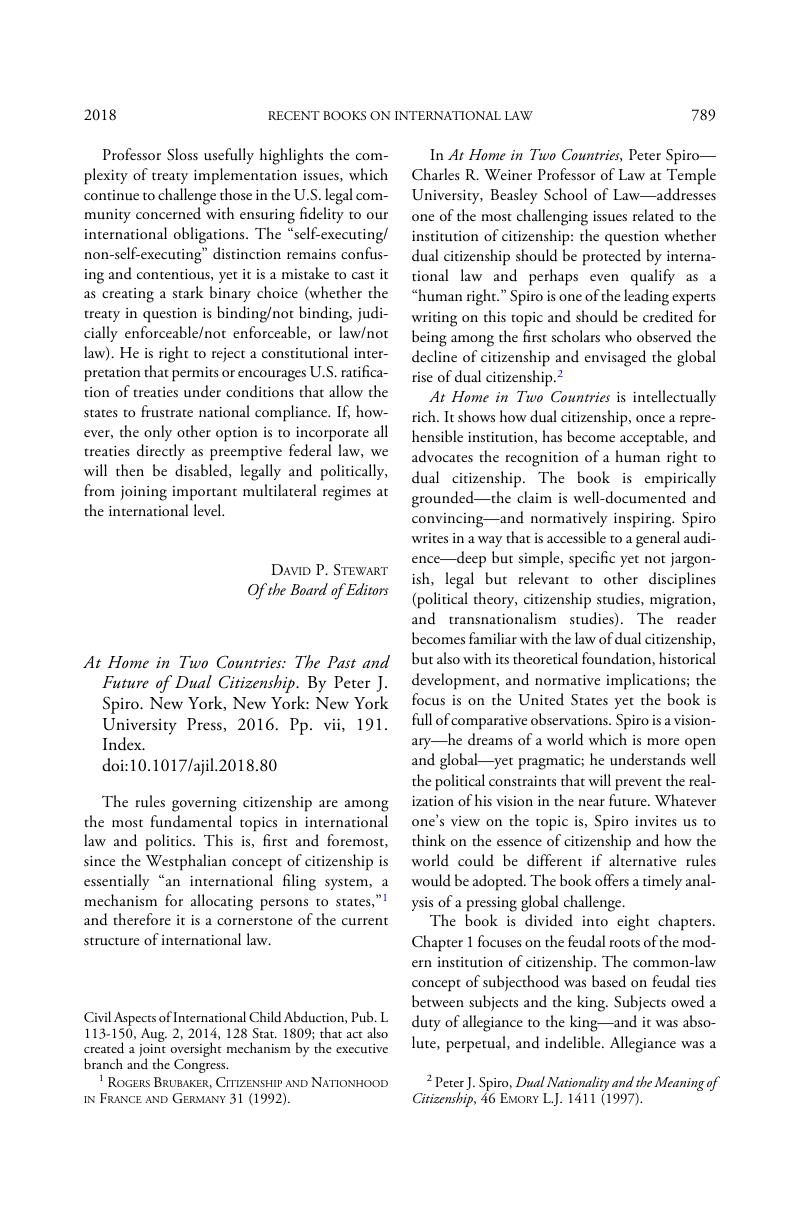No CrossRef data available.
Published online by Cambridge University Press: 17 October 2018

1 Rogers Brubaker, Citizenship and Nationhood in France and Germany 31 (1992).
2 Spiro, Peter J., Dual Nationality and the Meaning of Citizenship, 46 Emory L.J. 1411 (1997)Google Scholar.
3 William Blackstone characterized it by holding that an obligation to one's sovereign represented “a debt of gratitude, which cannot be forfeited, canceled, or altered, by any change of time place or circumstances.” See William Blackstone, Commentaries on the Law of England 1765, at 369–70 (1979).
4 The right to expatriation is currently recognized by the Universal Declaration of Human Rights, Art. 15(2), GA Res. 217A (III), UN Doc. A/810 (1948).
5 Perez v. Brownell, 356 U.S. 44, 50 (1958).
6 Judgement of May 21, 1974, 37 BVerfGE 217, 254–55.
7 Afroyim v. Rusk, 387 U.S. 253 (1967).
8 On the growing global legal acceptance of dual citizenship, see Harpaz, Yossi & Mateos, Pablo, Strategic Citizenship: Negotiating Membership in the Age of Dual Nationality, J. Ethnic & Migration Stud. (Mar. 20, 2018)CrossRefGoogle Scholar, available at https://www.tandfonline.com/doi/pdf/10.1080/1369183X.2018.1440482?needAccess=true; Global Expatriate Dual Citizenship Dataset, Maastricht Center for Citizenship, Migration and Development, Maastricht University, at https://macimide.maastrichtuniversity.nl/dual-cit-database.
9 Convention on Certain Questions Relating to the Conflict of Nationality Laws, Art. 1, April 12, 1930, 179 LNTS 89.
10 The European Convention on Nationality, Arts. 14, 16, Strasbourg, 6.XI.1997.
11 Nottebohm Case (Liech. v. Guat.), Judgment, 1955 ICJ Rep. 4, 23 (Apr. 6).
12 Spiro, Peter J., A New International Law of Citizenship, 105 AJIL 694 (2011)Google Scholar.
13 Global Compact for Safe, Orderly and Regular Migration 21 (Zero Draft, Feb. 5, 2018), available at https://refugeesmigrants.un.org/intergovernmental-negotiations.
14 Joppke, Christian, Citizenship and Immigration 31 (2010)Google Scholar.
15 Orgad, Liav, The Cultural Defense of Nations: A Liberal Theory of Majority Rights 85–114 (2015)CrossRefGoogle Scholar.
16 One can argue that access to the status of citizenship is becoming more liberal in one sense (who has access?), but less liberal in another sense (under which conditions?).
17 In a recent article, Rainer Bauböck demonstrates how international law can keep both open citizenship, which is easier to acquire, and the “genuine links” doctrine. See Rainer Bauböck, Genuine Links and Useful Passports: Evaluating Strategic Uses of Citizenship, J. Ethnic & Migration Stud. (Mar. 20, 2018), available at https://www.tandfonline.com/doi/full/10.1080/1369183X.2018.1440495.
18 Spiro's case is special—his father was a German who fled Germany before the Nazis took over—but the point is one of principal.
19 Shachar, Ayelet, Dangerous Liaisons: Money and Citizenship, in Should Citizenship Be for Sale? 3 (Shachar, Ayelet & Bauböck, Rainer eds., EUI Working Paper RSCAS 2014/01, European University Institute, 2014)Google Scholar.
20 For a distinction between a country as a “country house,” a “hotel,” and a “home,” see Jonathan Sacks, The Home We Build Together: Recreating Society 13–23 (2007).
21 See, e.g., Weiner, Myron, Security, Stability, and International Migration, 17 Int'l Security 91 (1992–1993)Google Scholar; Adamson, Fiona B., Crossing Borders: International Migration and National Security, 31 Int'l Security 165 (2006)Google Scholar.
22 Spiro discusses this topic in a different place. See Peter J. Spiro, The Equality Paradox of Dual Citizenship, J. Ethnic & Migration Stud. (Mar. 20, 2018), available at https://www.tandfonline.com/doi/full/10.1080/1369183X.2018.1440485.
23 Shachar, Ayelet, The Birth Right Lottery: Citizenship and Global Inequality (2009)Google Scholar.